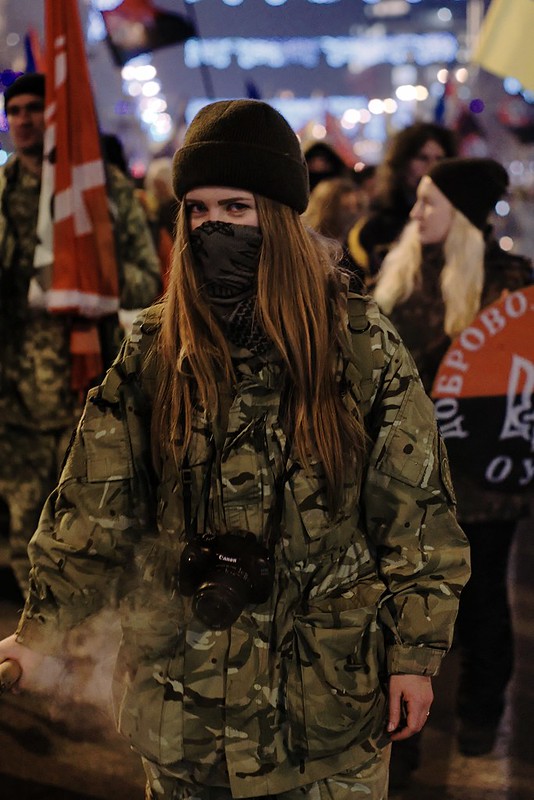
A justification given by the Russians for their invasion of eastern Ukraine is ‘denazification’. Is this an excuse, adding insult to the injury of military aggression, or is there truth to the alleged xenophobic extremism in Ukraine? Scholars of the Soviet Union, in which Ukraine was a republic, are not surprised that Nazi tendencies have caused renewed concern. A good witness, in this regard, is the Ukrainian-born Soviet writer Ilya Grigoryevich Ehrenburg (1891–1967), a Jew who went from communist propagandist to censored critic.
Soviet rule left a dark stain on Ukraine. Under the brutal dictatorship of Joseph Stalin, a great famine in the 1930s killed millions. The Holodomor resulted from the collectivisation of farms and drastic requisition of wheat by the Kremlin. Perhaps understandably, many Ukrainians welcomed Adolf Hitler’s forces in the Second World War. In 1941, when the Germans occupied Lwów (Lemberg/Lviv), the Ukrainian National League in Galicia proclaimed an independent state, but the leaders were arrested and sent to concentration camps. Engaging in guerrilla warfare in the late 1940s, the nationalist movement in western Ukraine was eventually suppressed by the Soviets.
Such subjugation, now being repeated by Putin, arouses sympathy for the Ukrainian people, who have a right to peace, freedom and autonomy. But terrible crimes have been committed in the struggle for nationhood. Nationalist leader Stepan Bandera was a blood-and-soil extremist who directed pogroms of Poles and Jews. Bandera (1909–1959) is celebrated by many Ukrainians as a national hero, despite his gruesome record of ethnic cleansing. His legacy is seen in the Azov Battalion, which overtly displays Nazi slogans and insignia.
In 1954, the oblast of Crimea was administratively placed within the adjoining Ukrainian Soviet Socialist Republic. Perhaps this was due to Nikita Khrushchev’s guilt over the famine (Khrushchev was the First Secretary of the Communist Party of Ukraine from 1939 to 1949). At the time, few commentators expected the USSR to fall apart; but wise men knew that the Ukrainian problem was intractable.
Journalist and historian Alexander Werth, who was born in St Petersburg in 1901 and became a British citizen after the Russian Revolution, wrote several books on the USSR and Stalin. In Russia: Hopes and Fears (1969), Werth quoted from his conversation with the elderly Ilya Grigoryevich, whom he met over lunch in Moscow.
Ehrenburg remarked on the rise in nationalism across the Soviet bloc and in the USSR itself since the demise of Stalinist dictatorship:
The whole world is becoming more Gaullist. The Russians are Russian Gaullists, with a sense of their own superiority, but there are also the Ukrainian Gaullists in the Ukraine, who now begin to contest the national superiority of Moscow. For economic, military and other practical reasons, the Soviet Union will stick together, no doubt, though I should not be absolutely sure that in, say, a hundred years, a large and rich country like the Ukraine, with now over forty million people, will necessarily remain part of the Soviet Union. Anyway, under our Constitution, the Ukraine may declare herself independent. The present line is, of course, “Just you try!”, but how do we know what will happen in a hundred or even fifty years?
In the aftermath of Khrushchev’s leadership of the USSR, Ehrenburg laid bare the festering anti-Semitism and nationalist fervour in Ukraine:
Khrushchev wasn’t really a bad man, and he will always have to his credit the fact that he had a good deal to do with throwing open Stalin’s labour camps. He had lived too long in my—though not his—native Ukraine, and had been infected by the kind of visceral anti-semitism that is still very far from being stamped out there. It has practically disappeared in a place like Moscow, but you still get a lot of it in Kiev.
Ehrenburg observed progress, however:
The Ukraine is changing today in a quite extraordinary way. In the past, there were Petliura and, later, Bandera nationalists who loathed practically everybody—the Russians, the Poles and, of course, the Jews. These were simply massacred. The only people they really admired were Hitler’s Nazis.
Modern nationalists, according to Ehrenburg, abhorred the anti-semitism of Ukraine’s past. They were now liberals; ‘their sympathies lie with Western culture’. Ukraine was, and remains, a hotch-potch of ethnic communities, including Poles, Transcarpathian Hungarians, Ruthenians, Romanians, Greeks, Bulgarians, Armenians, Tatars, Belorussians and Russians. Georges Jorré in The Soviet Union: the Land and its People (1960) described Ukraine as a Tower of Babel.
When the USSR collapsed, numerous former republics became independent, but Ukraine was the biggest loss to the Russian Federation, not least because a large proportion of Ukraine is ethnically Russian. Meddling by the West, through NATO and the European Union, escalated tension between the Western-aligned Ukrainian political establishment and those of its citizens who continue to identify with Russia.
Hatred of Russian-speaking people is the projection of an engrained character trait of a contested land. Past victims of persecution were Jews, Poles and Romany gypsies, but for Bandera followers, the Russian bear is a legitimate target. Animosity has been tacitly supported by the European Union, whose progressive values are a sham when it comes to territorial divide-and-rule tactics on the eastern edge of Europe.
The Azov Battalion and other Nazi-inspired groups in the Ukrainian army are the kind of blood-and-soil nativists that the EU is meant to oppose. Instead, they are being armed to the teeth by Ursula von der Leyen and the satellite governments of Brussels (as well as faux-Brexit Britain). Soon, German tanks will rumble over Black Earth Country again, cheered on by Nazi sympathisers.

